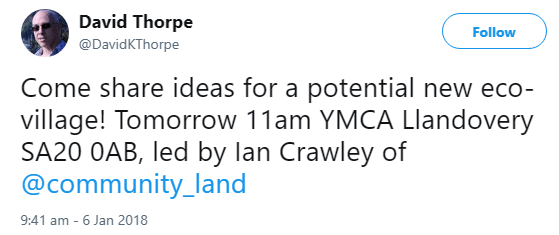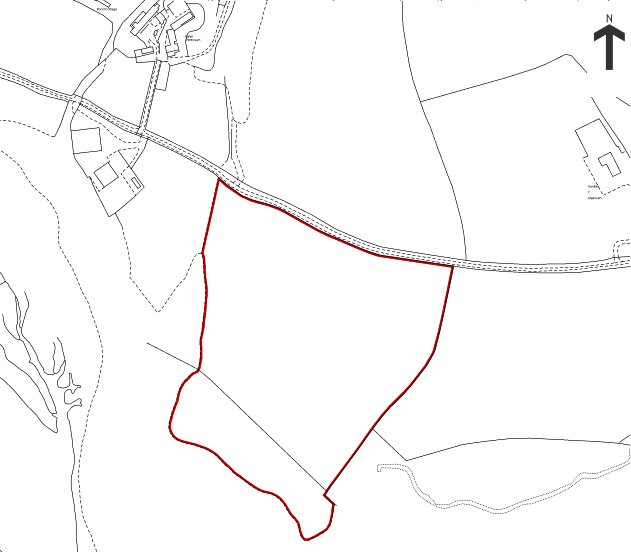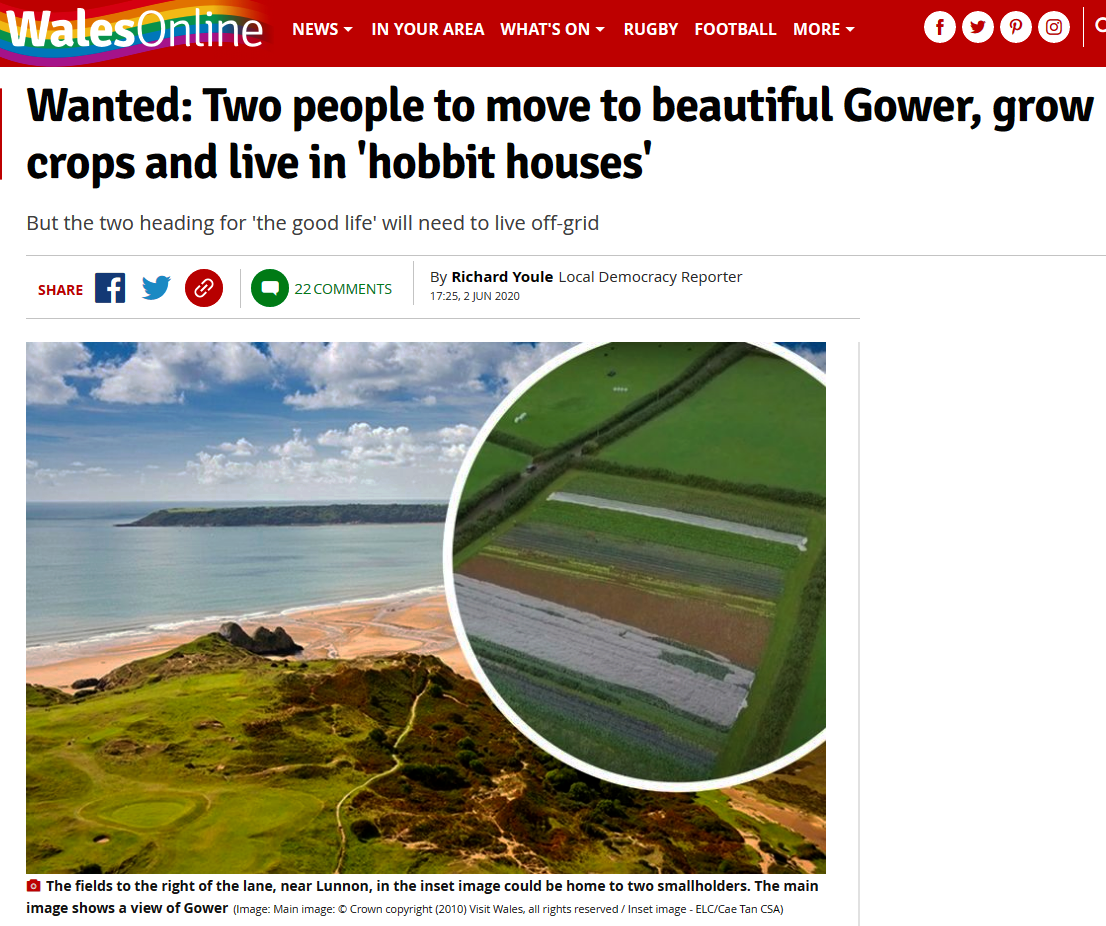![]() In this piece I shall look at what might be a renewed attempt to promote OPDs, or perhaps it’s just another bit of ‘affordable housing’ flim-flam. Maybe a bit of both.
In this piece I shall look at what might be a renewed attempt to promote OPDs, or perhaps it’s just another bit of ‘affordable housing’ flim-flam. Maybe a bit of both.
For newcomers . . . the OPD system is unique to Wales; it allows people to build a dwelling in open country as long as they promise to worship the sun, name their sprogs Earthworm and Beelzebub, and grow a couple of carrots to prove they’re ‘farmers’.
I’ve written about OPDs many times. Just type ‘OPD’ in the search bar.
◊
GARRISON OPD
Three years ago I introduced Garrison Farm CIC, you’ll find it in this post, scroll down to the relevant section. The two principals were Ross Edwards and Chris Carree. Carree left the company in June 2021 but Edwards is still there.
I assume Garrison Farm is still a going concern because three new directors have joined since Carree left. Let’s look at them in the order they joined.
First, 04.10.2021, was Kevin John Foley, who’s worked for Admiral insurance for 20 years. Is his employer chipping in?
Next we have, 30.06.2023, Christopher Mark Kelshaw. Another Army veteran.
Finally, we have Michael Paul Smith, 05.08.2023, who is Senior Facilities and Project Officer for Swansea council, and has worked for the council for over 20 years. Swansea council contributing?
The plan is to set up – possibly in Swansea, or maybe Carmarthenshire – a kind of OPD community for former military personnel. That’s the impression I get in this video from February last year. (Watch from 38:00.)
The webinar is hosted by David Thorpe, founder / director of the One Planet Centre and co-founder / patron of the One Planet Council.
Thorpe was clearly recovering from a stroke, which he attributed to ‘climate anxiety’.

Thorpe has crossed my path a few times over the years as I’ve researched OPDs. And the idea of a community of OPDs is not new. As this tweet of Thorpe’s from January 2018 makes clear.

Though I don’t know what project was being discussed, or even if there was a specific project mooted. So much OPD discussion is little more than pipedreams.
But to return to Swansea, where there was certainly a project launched that could plausibly be called a community. This was Killan-Fach Eco-farm on the Gower side of the city. (Marginally more attractive than the Port Talbot side.)
I wrote about it in June 2020 in One Planet Developments, just scroll down to the section ‘Farmlets’.
The council knocked it back for a number of reasons. One being that . . .
There is also no evidence of how the development would meet local affordable housing needs
Which tells me that ‘affordable housing’ was one of the angles used in the hope of getting planning consent for an OPD project. This is interesting, because you’ll be reading more about affordable housing, and ‘co-operative social housing’, in a minute.
But before that it might be worth focusing on Ross Edwards a little.
From his Linkedin profile we learn that since January this year he’s been Business Development Manager for Rouute. Here’s the website. It describes its product as a, “road-based energy harvesting system“.

If I understand it . . . pads or sensors are placed on the road surface and vehicles driving over them generate electricity. Even if it works, we’re unlikely to see this technology in Wales because we’re heading towards a vehicle-free future.
There’s another military connection here at Rouute. For CEO is Antony Edmondson-Bennett, a former army officer who, according to his now disappeared Linkedin bio, is trained in ‘close protection’. (It was there last week when I was researching this.)
The Rouute website announces a link-up with a firm called Carma. Here’s a very short video starring the founder of Carma, Jim Holland.
I found the Carma website easily enough, but there is no company of that name registered with Companies House. It was only by scrolling down to the small print at the bottom that I found, “Carma is a trading name of Rewards.Earth LTD 13315107“.
So let’s see what else we can learn.
◊
‘I THINK THAT I SHALL NEVER SEE . . . ‘.
The arrangement between the two, as spoken by Jim Holland of Carma, is that . . .
Rouute Technologies Ltd will be planting trees for every single unit they sell in the UK or abroad.
While on the Carma website we read of: “UK trees planted by veterans via The Green Task Force“. Here’s the Companies House entry.
On the ‘Meet the Team‘ page of the website we see: “Our target is to plant tens of millions of trees in the next five years“. That is some ambition!
Rooting around for more information I naturally looked up Holland’s Linkedin page, where we see that he was in the Royal Navy for 13 years. So another military connection.
In this rooting around ‘South Wales’ appeared more than once.
One mention involved Paul Webb of Pontypool, who spent 12 years in the Royal Navy. The other mention was about planting trees for Sussex software company Tillo. On that Tillo website we read:
This March, ten members of the Tillo team will be making their way to South Wales for a day of tree planting in partnership with Carma.
Despite the nonsense about saving the planet, what we’re looking at here is greenwash; and it must be bracketed with outfits like Stump Up For Trees, and investment vehicles like Foresight, buying up Welsh farms.
Too much of Wales is being lost in this way. We don’t need any more of it.
◊
DRAKEFORD SPEAKS!
I’ve got a treat for you now – a video clip of our Glorious Leader! It’s from Tuesday last week (Oct 17).
Drakeford was responding to a completely unrehearsed and piercing question from Huw Irranca-Davies MS. Here’s the transcript.

Seeing ‘Mike Hedges’ and ‘fascinating’ in the same sentence is quite hilarious.
But here’s where I want to focus, on this section referencing “co-operative social housing managed and owned by the people who live in them“:
And the good news is, Llywydd, that we have a new wave of initiatives being led in different parts of Wales: the Solva community land trust, the Gower community land trust, the Taf Fechan Housing Co-operative in Merthyr—all of them initiatives designed to develop housing that will be run and managed by the people who live in them.
In his ‘question’ Irranca-Davies makes reference to “international youth leaders” in attendance, though God knows why anyone would travel to listen to those clowns. Let alone travel any distance.
◊
THE EXAMPLES DRAKEFORD QUOTED
Drakeford mentioned three examples of co-operative social housing. These were, to quote him verbatim: “the Solva community land trust, the Gower community land trust, the Taf Fechan Housing Co-operative in Merthyr”.
Let’s look at them, working backwards.
Taf Fechan looks like an offshoot of housing association Merthyr Valley Homes. I guess it takes over or runs MVH properties. If so, then it’s not a group of locals coming together afresh to build and manage their own community.
Now let’s turn to Solfa.
The Solva Community Land Trust was launched under the direction of, or with the help of, Planed in September 2019. “Planed delivers sustainable outcomes for communities by a collaborative, people-led approach“.
But I’m not sure what if anything’s happened since.
There’s this report from the Western Telegraph (19.02.2021) telling us that 18 affordable homes will be built on Solfa football field. But were they built?
Adding to the uncertainty is that nothing’s been posted on the ‘News’ section of the group’s website (scroll down) since January 2021. Nothing added to the SolvaCLT Twitter / X account since January 2022. And the latest accounts filed with the Financial Conduct Authority show just a few quid in the kitty.
An internet search turned up this from March this year, which suggests the properties are still not built.

The third project mentioned by Drakeford was in Gower. And I assume he was referring to Gŵyr Community Land Trust. Here’s the website.
Though it’s registered with Companies House as Gower Land Trust CIC, launched May 2021. And with just a few hundred in the piggy-bank it’s also difficult to see where this is going without a major injection of funding.
But it seems to have a rival in the Gwyr Community Land Trust Ltd, launched August 2023. This is a one-man band run by a local, Roger Brace.
I mention that Roger Brace is local because, looking at those involved in Gŵyr Community Land Trust, I see that a number of them are newcomers to Wales.
Director Adam Jefferson Land was not long ago pushing a similar venture over in Devon. (Fellow-director Niaomh Convery came to Swansea with him.) Another of the three directors, Emily Robertson, came to Wales a few years ago after working for Solace Women’s Aid in London.
Going by the bios and other evidence, this crew is sure to appeal to ‘progressive’ politicians. An impression strengthened by the image used in this WalesOnline report in November 2021.

◊
THE BIT AT THE END WHERE I PULL IT ALL TOGETHER
OPDs, as originally conceived, never really took off. While throwing up a shack in the countryside might appeal to many, needing to prove that you were living a largely self-sufficient lifestyle seems to have put many off the idea.
To make things worse, the idea was highjacked by unscrupulous, often unsavoury individuals and groups, buying land, often tracts of forestry, then selling or renting plots for people to put up cabins or bring in mobile homes.
The examples below are from Llangynog, Carmarthenshire, and they were sent to me a couple of years back. They’re not OPDs, and they don’t have planning permission.
But those who live in them will employ the OPD defence against council planners.

I’m not suggesting that Wade William Heames is either unscrupulous or unsavoury, but his Edible Forest projects have come in for a lot of criticism. Much of it from people who’d been tempted to buy in, or even had bought in.
Also, from those threatened with being neighbours to one of his projects.
Which brings me back to Ross Edwards and Garrison Farm. I might accept this project if it was home to Welsh ex-service personnel. But if it’s nothing more than a smokescreen for greenwashing, then I would object.
The video you saw earlier, starring Ross Edwards and David Thorpe was produced by Cwmpas. (Formerly, Wales Co-operative Development & Training Centre Ltd.)
Cwmpas is pushing co-operative and community-led housing. Naturally, I went to the Financial Conduct Authority website to get some info on Cwmpas. Here’s the annual return and accounts for year ending 31.03.2022.
Income of £6.5m from “‘Welsh Government’, European funding, other grants and sources of income“. With two-thirds of that income going on the 100 staff.
And I bet you’d never heard of Cwmpas until you read this. How many more such beasties are out there, lurking in the shadows, devouring unwary maidens and feasting on public funds?

You’ll see that the Cwmpas accounts were signed off by the then secretary, D Walker. Now Derek Walker – for it is he! – is the Future Generations Commissioner. Does he plan to breathe new life into OPDs in his new role?
Whatever Walker may have planned, Drakeford was talking about more conventional housing. But to understand why we are where we are, you need some background information.
It was always my belief that the left wing administration in Corruption Bay wanted rented housing to be the sole preserve of housing associations . . . with these in turn funded and controlled from the Bay.
But the close relationship that developed led the ONS to decide that Welsh housing associations were, effectively, public bodies. This resulted in them being privatised. Explained here from a ‘Welsh Government’ perspective.

Welsh housing associations are now building many fewer homes for rent. Some are building none at all. They, and their subsidiaries, are focused almost exclusively on private, open market housing.
This helps explain why some councils are trying to make up the shortfall.

Adding to the problem is the ‘Welsh Government’s ongoing campaign against private landlords.
Finally, and especially in rural areas, we have the issue of holiday homes, also retirees and others buying property and moving in permanently.
So . . . fewer housing association properties for rent; private landlords quitting the business; councils spending money they may not have trying to fill the gap; politicians tickling rather than tackling the rural housing crisis; to a backdrop of recession, a ‘de-growth’ agenda, and increasing economic hardship enforced by following the lunacies of Net Zero.
There could be a perfect storm approaching . . . and this storm will have bugger all to do with any imaginary ‘climate crisis’.
Which is why I would hope to see official support for local people getting together to help themselves. But the examples quoted by Drakeford do not inspire confidence.
One thing for sure – a government making major expenditure cuts, and councils that are also feeling the pinch, should not be funding good-lifers hoping to settle in scenically attractive areas with which they have only the most tenuous connection.
The only real solution is a comprehensive and national housing strategy. But it would need joined-up thinking and hard work – from a ‘Welsh Government’ that prefers soundbites and virtue signalling!
♦ end ♦
© Royston Jones 2023


























